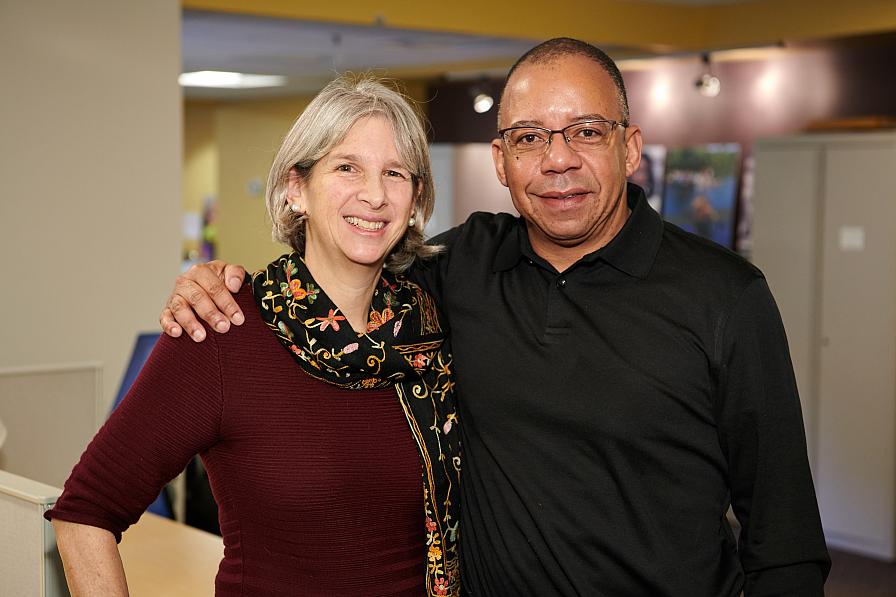
Susan Musinsky and Mark Watson at the SIF Open House, November 29, 2018
Congratulations to our 2026 Social Innovators!

Susan Musinsky and Mark Watson at the SIF Open House, November 29, 2018
When SIF made plans to move our offices out of One Congress Street this fall, a few of our coworking member organizations made decisions that it was time to go out on their own. Our Executive Director, Susan Musinsky, interviewed Mark Watson, the Executive Director of Boston Impact Initiative (BII). BII fills a unique role in the social impact space. They are building a fund that is focused on economic justice, and investing in opportunities for all people—especially those most oppressed or abandoned by our current economic system—so that they can lead a dignified and productive life. Mark shares the growth that BII experienced during their time at the SIF coworking space, and what they are taking with them from the coworking experience as they set up their own offices and maintain a connection with the coworking hub.
Below are some memorable moments from their conversation.
Susan: How did you learn about SIF’s coworking space?
Mark: Julia Shanks had a small get together in the summer of 2017 for people working in the social impact space. When we began talking about offices, that was the first time I’d thought about going in with other organizations instead of going out on our own. There were many other things we chatted about, and I realized that SIF and BII should really spend some time together, and find ways to make deeper connections for our organizations. What a better way to do that than working side by side.
Susan: When you took a tour, what drew you in?
Mark: Anna was one who took me around last fall, and I was sold. The idea that we could move in to a really nice space in the heart of the city when we were ready, and that we could have prime seats in a downtown location that was comfortable, clean and welcoming, and that we could be flexible about if we were coming for a few months or a few years was a great option for us.
Susan: What was so unique about the coworking experience?
Mark: We could show up any day of the week, and just concentrate on getting our work done. There were people to help us along the way if we needed some input (hiring, tech, idea generation, etc.), but the space allowed our team to really develop and move forward. The fact that we could hold quiet meetings, have visitors (both large and small groups) and not worry if we had the right space, was a great plus for a small organization.
It also serves as the nucleus of the necessary support every leader needs to make their organization maximize impact.
Susan: What beyond space was provided to you?
Mark: Most important was the access to social capital that SIF loaned to us while in the space. Not a week would go by when we didn’t meet people – and I mean all kinds of people. There were of course people we ran into who became friends, but you [Susan] introduced us to a number of people who became funders and partners in our work. It was invaluable, and something we will miss. SIF became an integral partner and friend to BII. From the first pot-luck event before we arrived, we began to make new friends and connections. I recall a really early chat with Chien-Chi Huang, the ED from Asian Women for Health. We have continued that dialogue since our meeting last December. Snacks also loomed large in the reference of what was around. We moved to SIF from our Founder’s living room and many of us had been known to never pause to eat. At SIF, we gathered for food, found great left-overs from big events, and had nutritious snacks to help us make it through a cold or busy day. As we just moved over to Mass Ave, our team insisted that we continue the snacks as they helped to build comradery and allow people to gather more often.
Susan: Why did you decide to get your own office space?
Mark: We work closely with over 20 small businesses and non-profits in the Boston area. They are all led by or committed to communities of color. We saw an opportunity, like SIF, to serve as a partner and colleague to a few of our growing groups, and decided to get an office and have two of them (Ujima Project and the Center for Economic Democracy) move in with us. This is one step for us, in trying to bring many of the social impact for-profit players in Boston under one roof. We hope to keep moving in that direction.
Susan: What are the tangibles that you miss?
Mark: Yvrantz! She ran the coworking space with energy, commitment, and warmth. Whenever we wanted to talk, needed help, or had something happen in the space, she was our go-to person. She made everyone in the space feel like they belonged, like the space was theirs, and like we were a community. We also are in a smaller space now, so we miss the big rooms, and the chance to escape somewhere and build community with newer friends!
Susan: Lastly, some words that come to mind when you think of the SIF coworking space.
Mark: Now as I have just seen your new coworking space as a visitor to your Open House, I’m reminded that Boston is very fortunate to have an organization like SIF to constantly bathe mission aligned nonprofit entrepreneurs in a sea of innovative ideas coupled with social and financial capital. Most importantly, it also serves as the nucleus of the necessary support every leader needs to make their organization maximize impact.